Real Estate Agent Resume Examples

Mar 31, 2025
|
12 min read
Elevate your real estate agent resume and close the deal on your dream job by showcasing your skills, achievements, and experience. Learn how to create a winning first impression with expert tips tailored for you.
Rated by 348 people
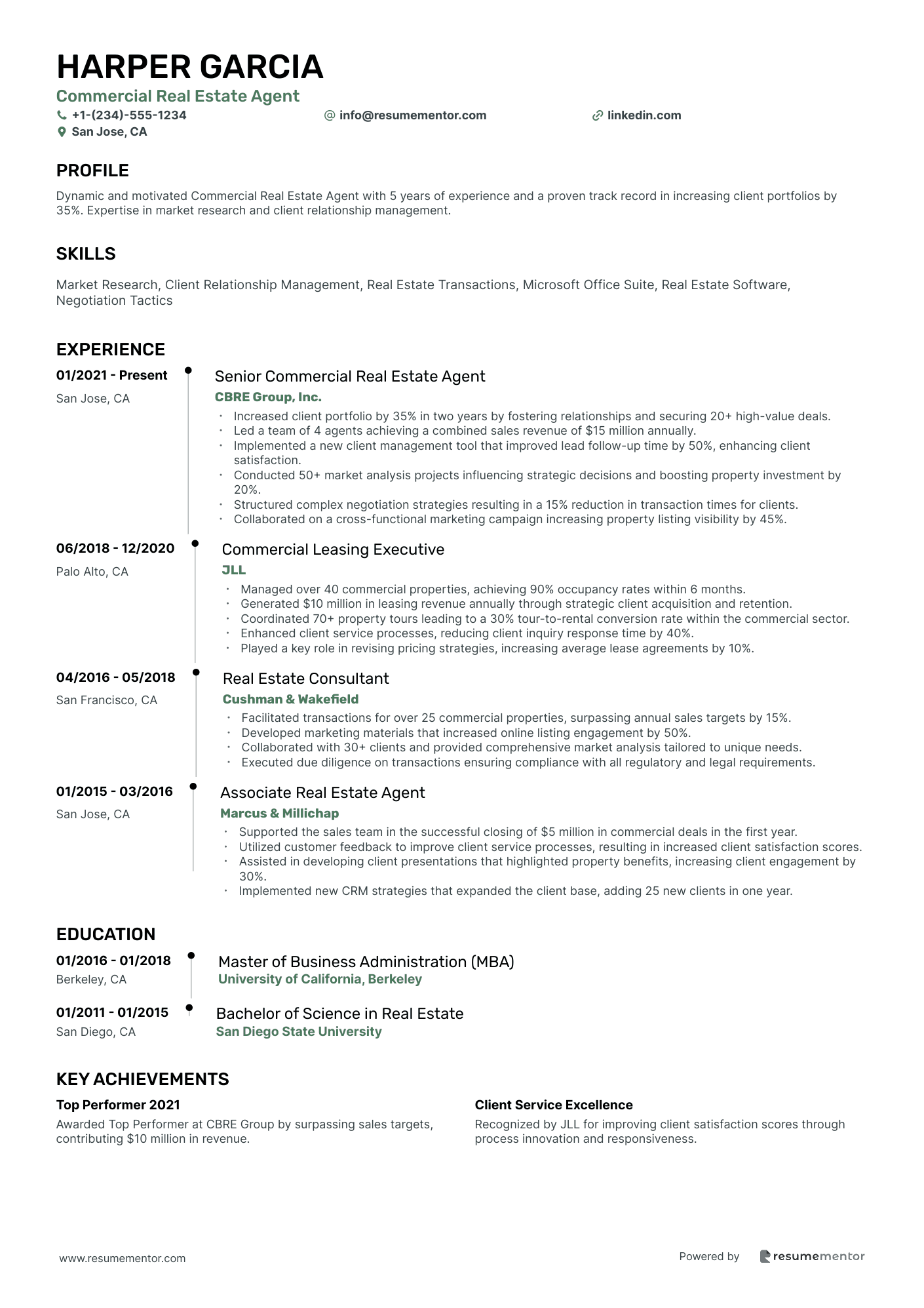
Commercial Real Estate Agent
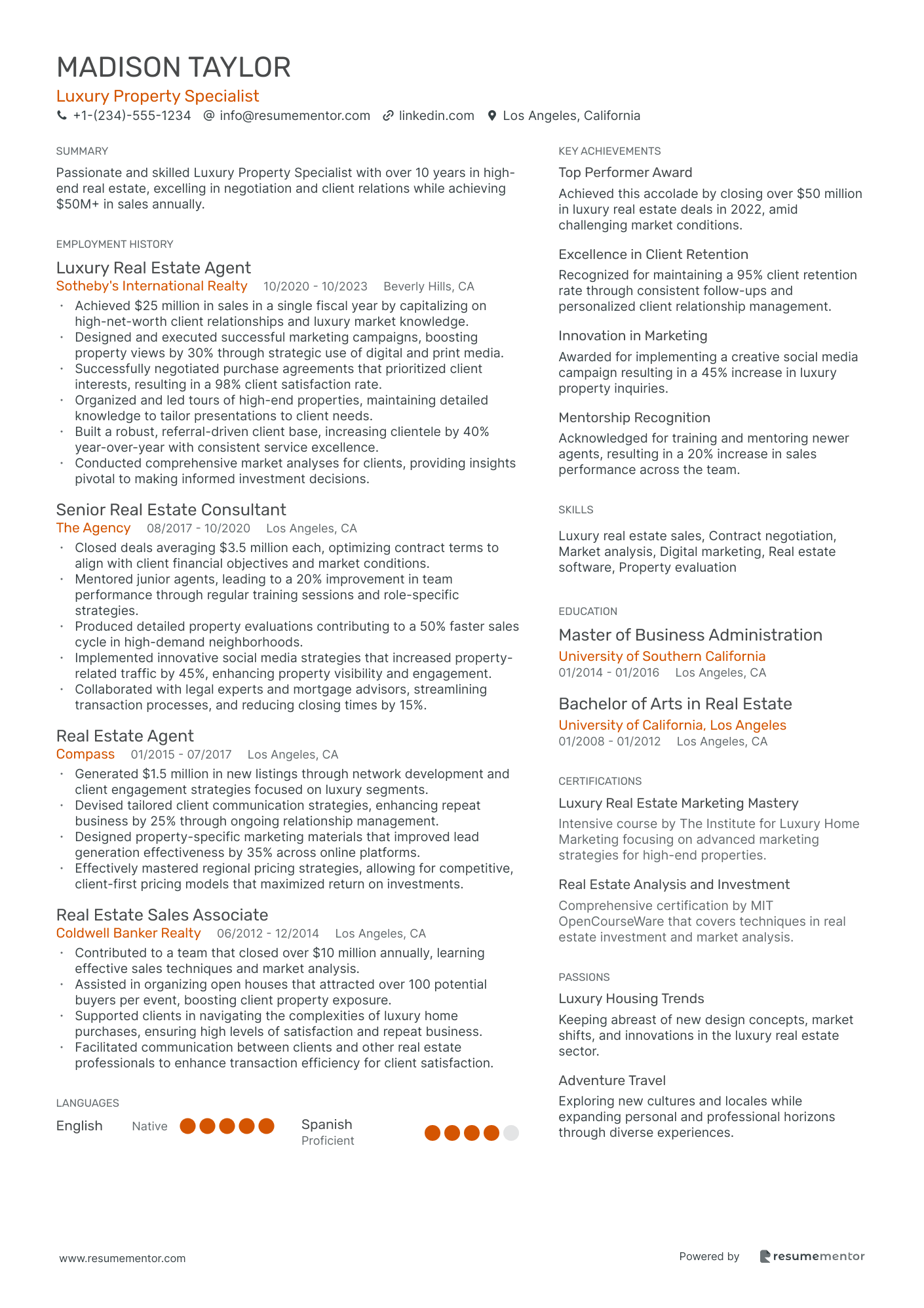
Luxury Property Specialist
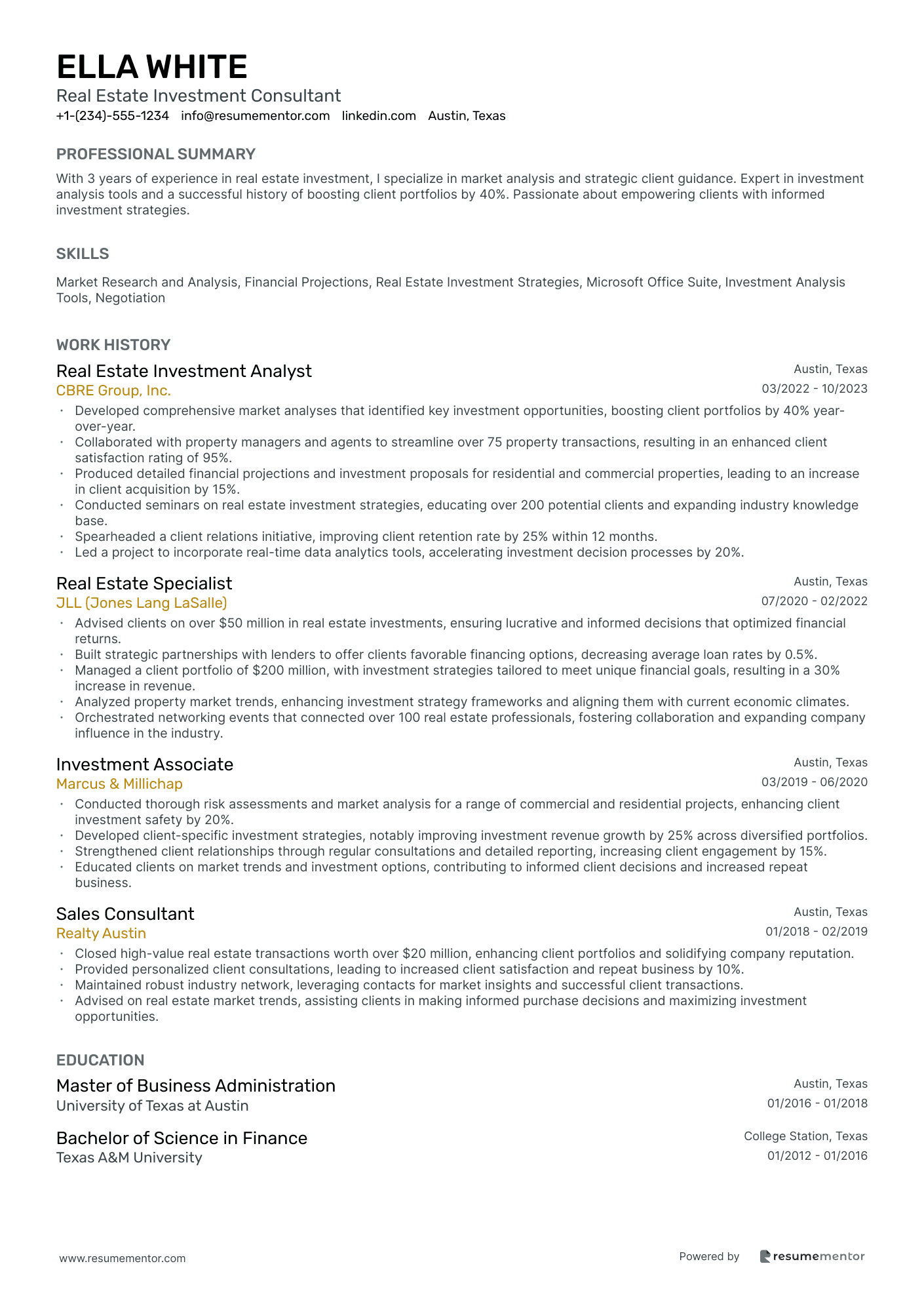
Real Estate Investment Consultant
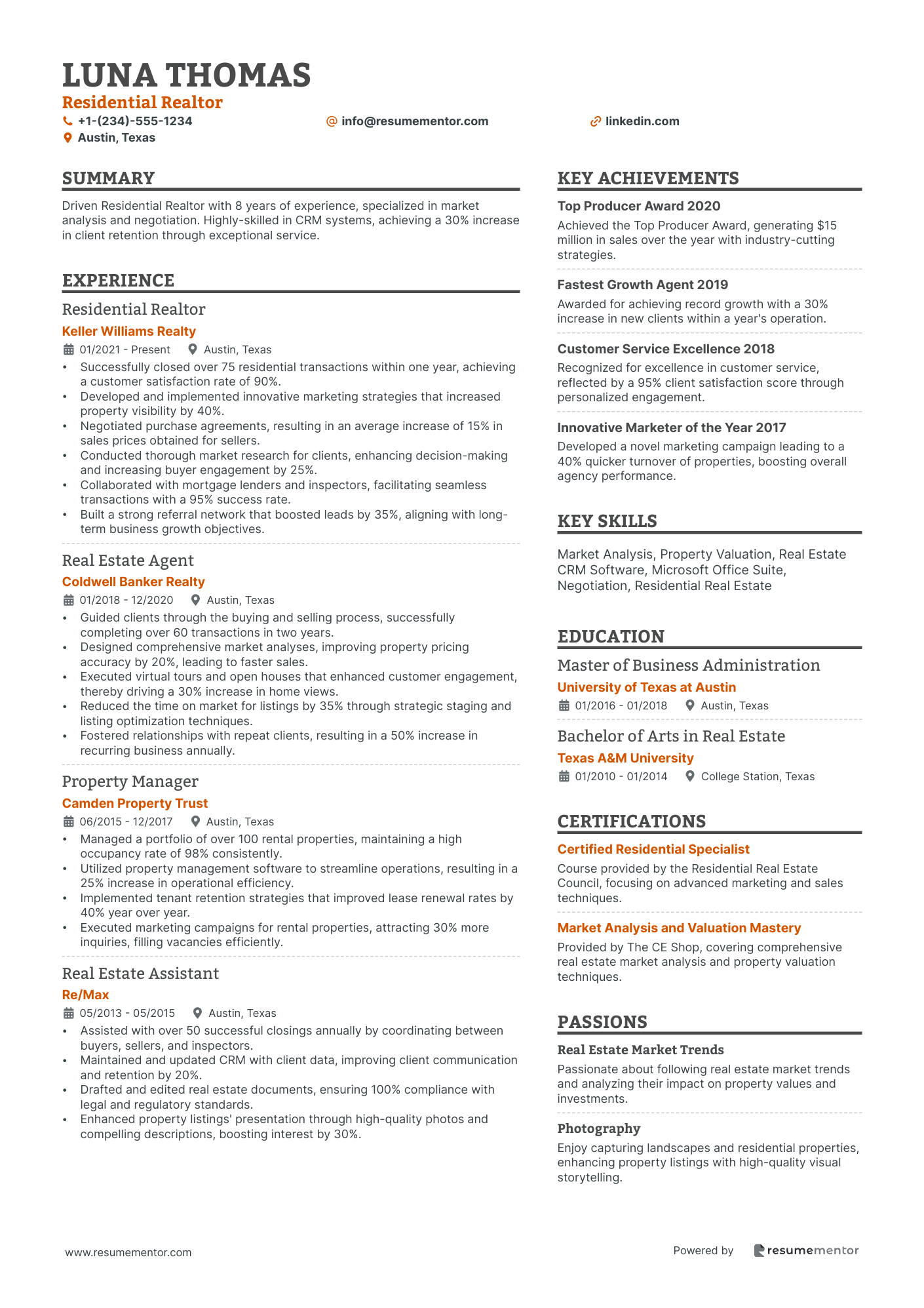
Residential Realtor
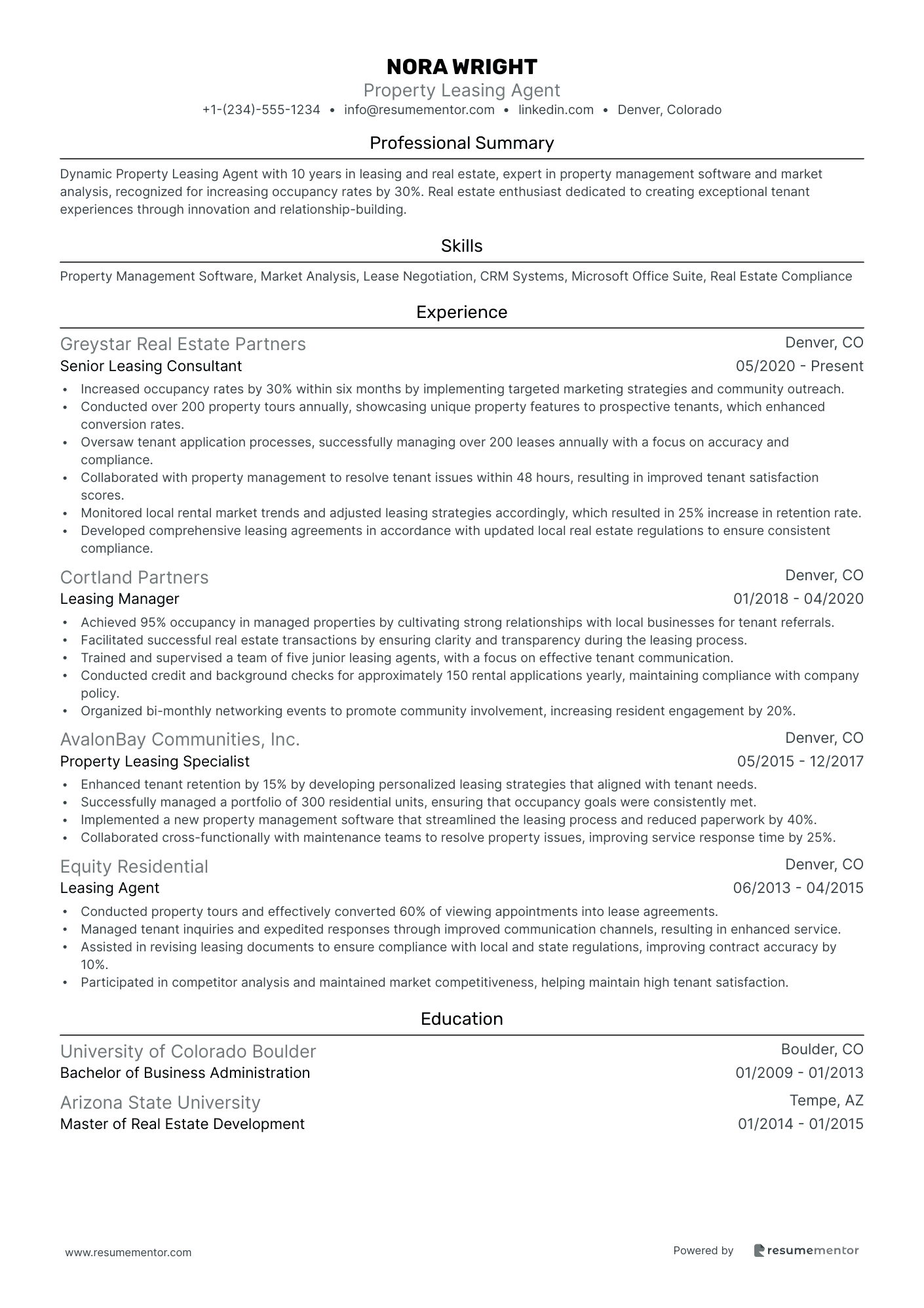
Property Leasing Agent
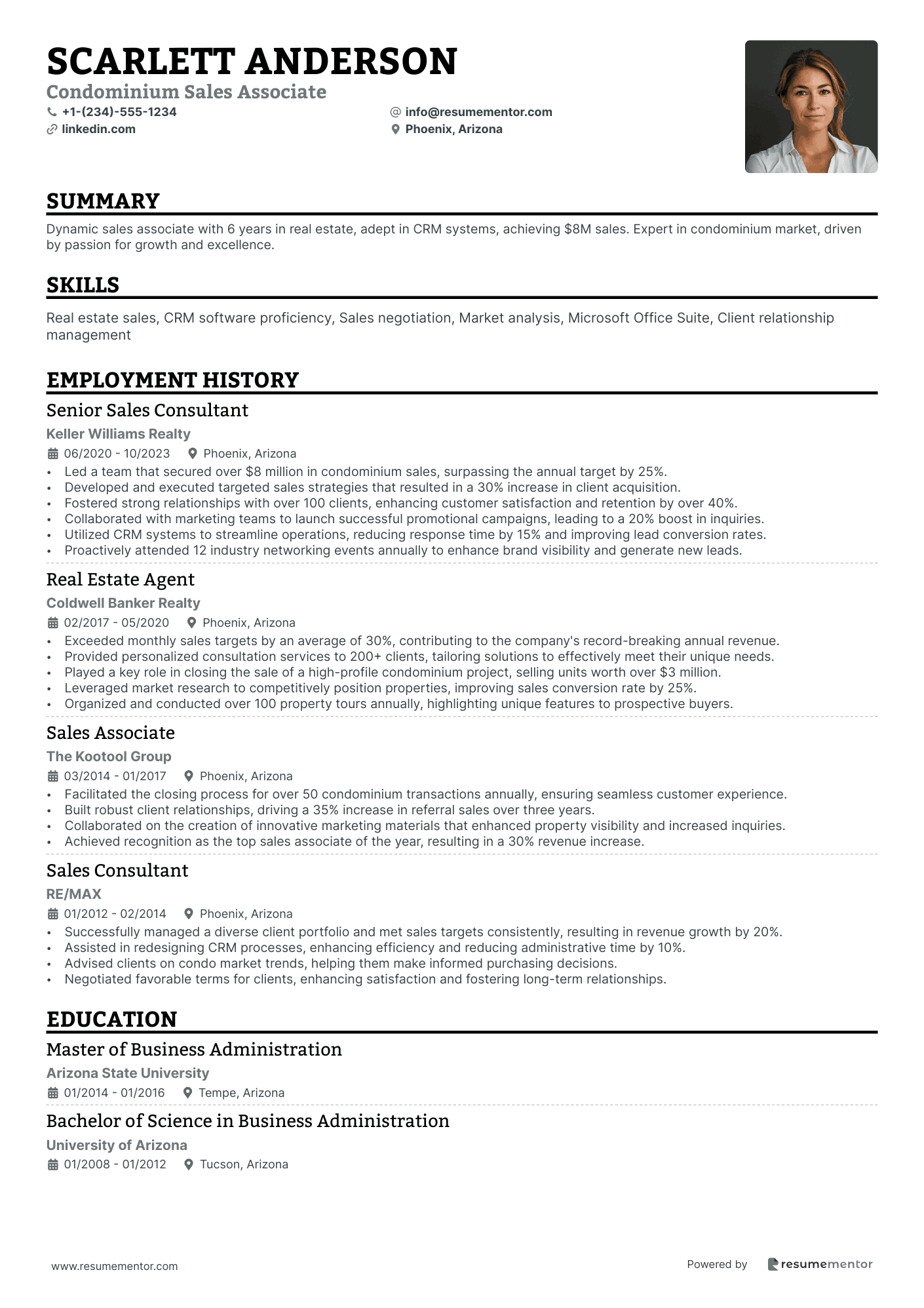
Condominium Sales Associate
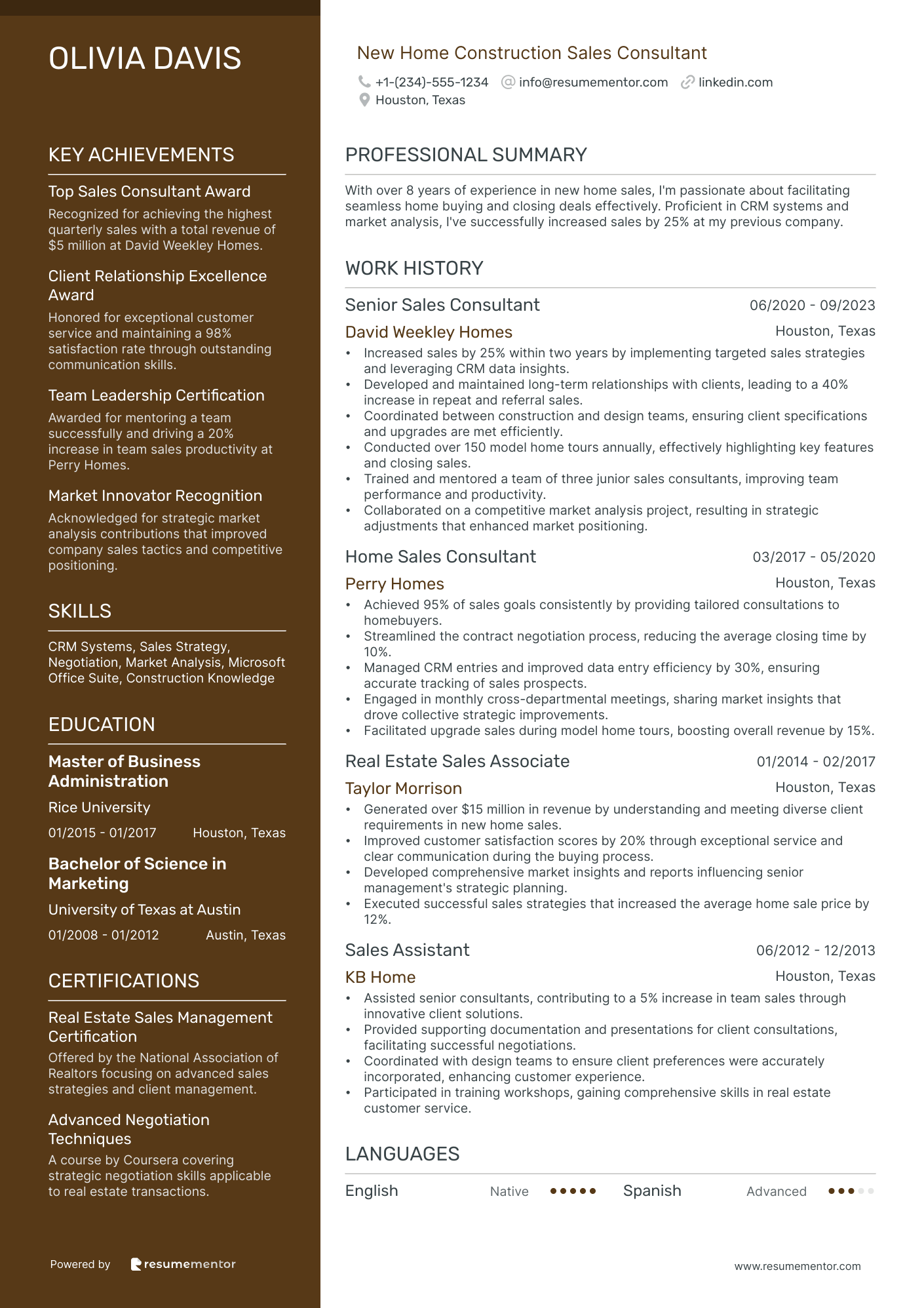
New Home Construction Sales Consultant
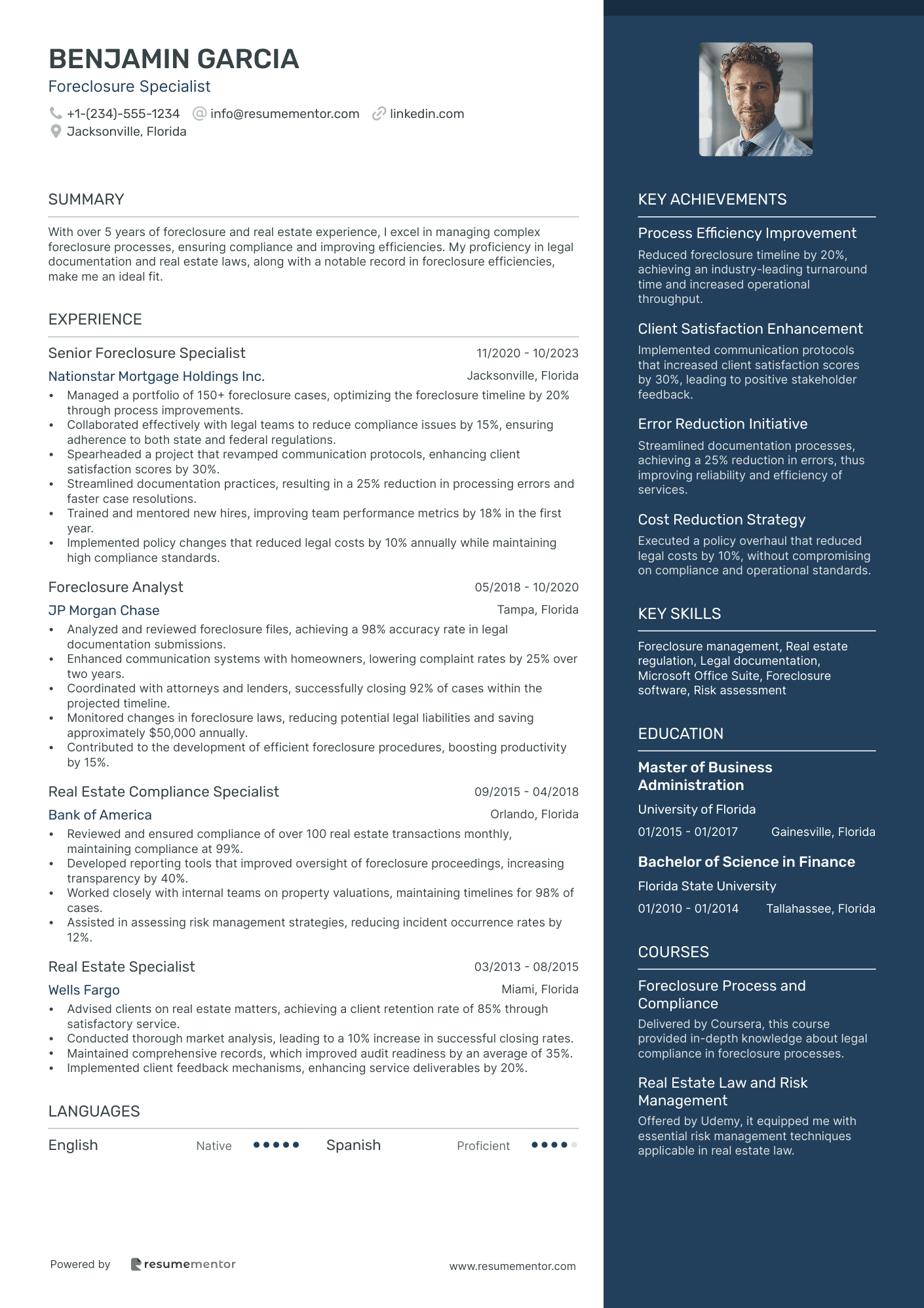
Foreclosure Specialist
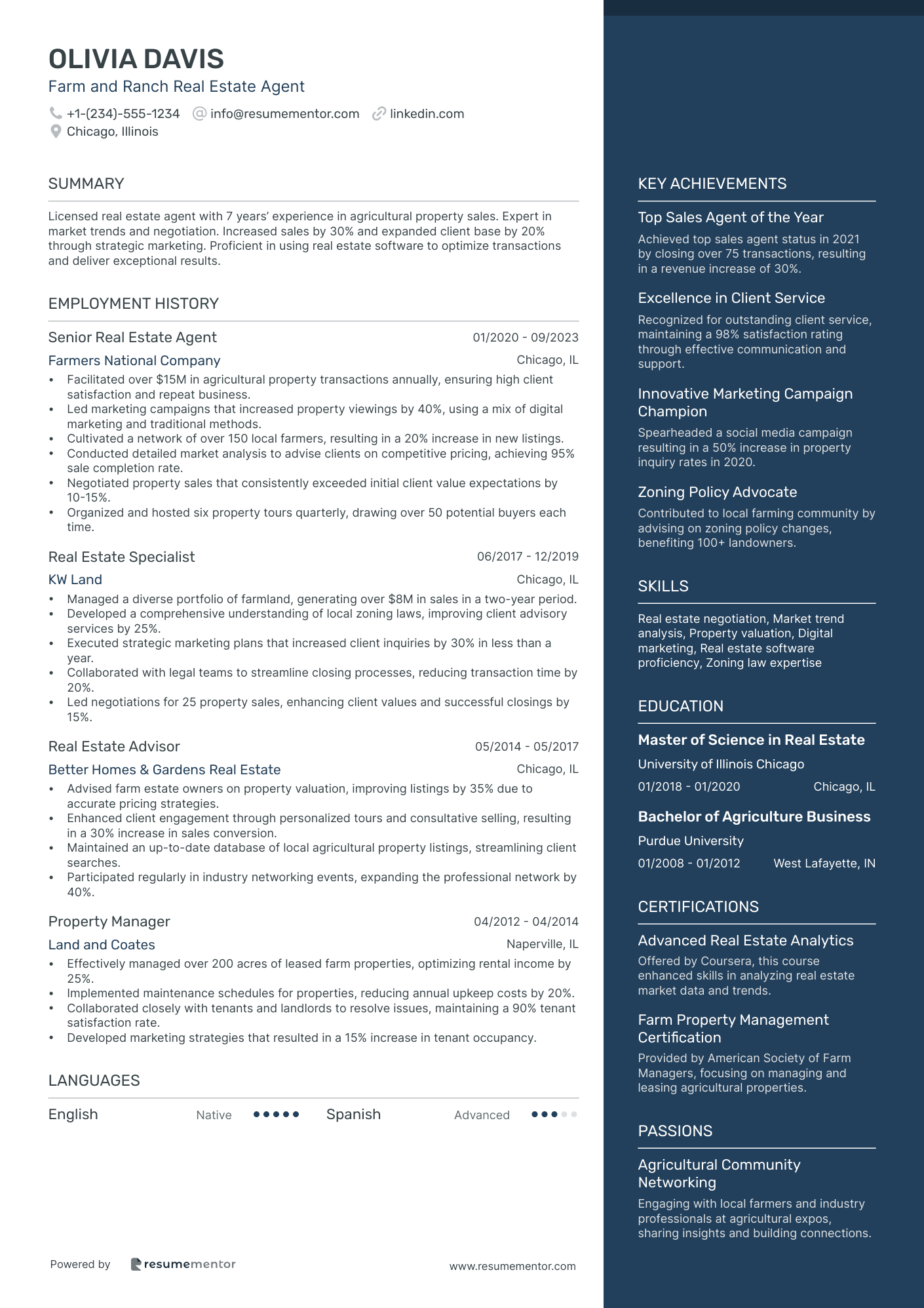
Farm and Ranch Real Estate Agent
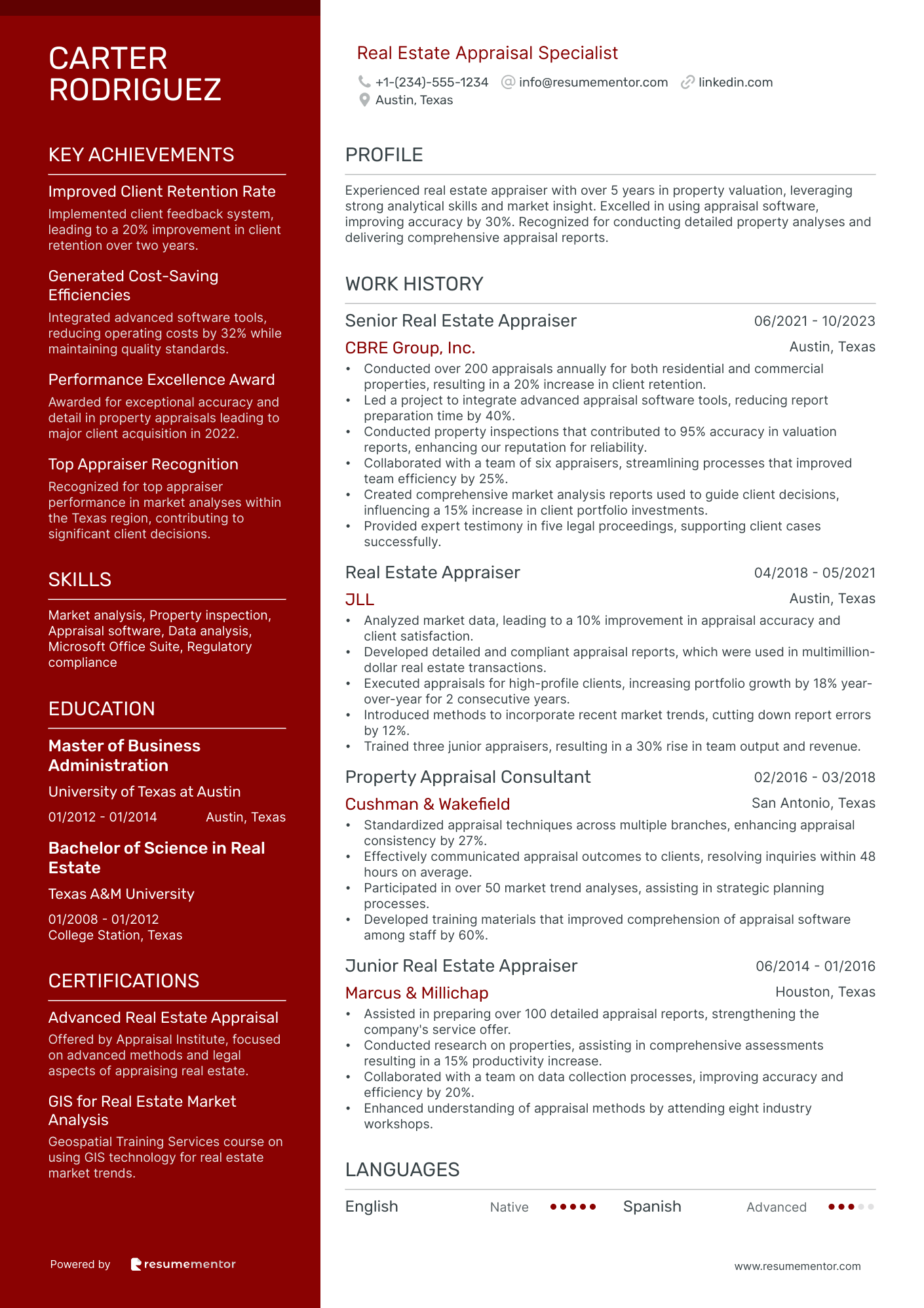
Real Estate Appraisal Specialist

Commercial Real Estate Agent resume sample
- •Increased client portfolio by 35% in two years by fostering relationships and securing 20+ high-value deals.
- •Led a team of 4 agents achieving a combined sales revenue of $15 million annually.
- •Implemented a new client management tool that improved lead follow-up time by 50%, enhancing client satisfaction.
- •Conducted 50+ market analysis projects influencing strategic decisions and boosting property investment by 20%.
- •Structured complex negotiation strategies resulting in a 15% reduction in transaction times for clients.
- •Collaborated on a cross-functional marketing campaign increasing property listing visibility by 45%.
- •Managed over 40 commercial properties, achieving 90% occupancy rates within 6 months.
- •Generated $10 million in leasing revenue annually through strategic client acquisition and retention.
- •Coordinated 70+ property tours leading to a 30% tour-to-rental conversion rate within the commercial sector.
- •Enhanced client service processes, reducing client inquiry response time by 40%.
- •Played a key role in revising pricing strategies, increasing average lease agreements by 10%.
- •Facilitated transactions for over 25 commercial properties, surpassing annual sales targets by 15%.
- •Developed marketing materials that increased online listing engagement by 50%.
- •Collaborated with 30+ clients and provided comprehensive market analysis tailored to unique needs.
- •Executed due diligence on transactions ensuring compliance with all regulatory and legal requirements.
- •Supported the sales team in the successful closing of $5 million in commercial deals in the first year.
- •Utilized customer feedback to improve client service processes, resulting in increased client satisfaction scores.
- •Assisted in developing client presentations that highlighted property benefits, increasing client engagement by 30%.
- •Implemented new CRM strategies that expanded the client base, adding 25 new clients in one year.
Luxury Property Specialist resume sample
- •Achieved $25 million in sales in a single fiscal year by capitalizing on high-net-worth client relationships and luxury market knowledge.
- •Designed and executed successful marketing campaigns, boosting property views by 30% through strategic use of digital and print media.
- •Successfully negotiated purchase agreements that prioritized client interests, resulting in a 98% client satisfaction rate.
- •Organized and led tours of high-end properties, maintaining detailed knowledge to tailor presentations to client needs.
- •Built a robust, referral-driven client base, increasing clientele by 40% year-over-year with consistent service excellence.
- •Conducted comprehensive market analyses for clients, providing insights pivotal to making informed investment decisions.
- •Closed deals averaging $3.5 million each, optimizing contract terms to align with client financial objectives and market conditions.
- •Mentored junior agents, leading to a 20% improvement in team performance through regular training sessions and role-specific strategies.
- •Produced detailed property evaluations contributing to a 50% faster sales cycle in high-demand neighborhoods.
- •Implemented innovative social media strategies that increased property-related traffic by 45%, enhancing property visibility and engagement.
- •Collaborated with legal experts and mortgage advisors, streamlining transaction processes, and reducing closing times by 15%.
- •Generated $1.5 million in new listings through network development and client engagement strategies focused on luxury segments.
- •Devised tailored client communication strategies, enhancing repeat business by 25% through ongoing relationship management.
- •Designed property-specific marketing materials that improved lead generation effectiveness by 35% across online platforms.
- •Effectively mastered regional pricing strategies, allowing for competitive, client-first pricing models that maximized return on investments.
- •Contributed to a team that closed over $10 million annually, learning effective sales techniques and market analysis.
- •Assisted in organizing open houses that attracted over 100 potential buyers per event, boosting client property exposure.
- •Supported clients in navigating the complexities of luxury home purchases, ensuring high levels of satisfaction and repeat business.
- •Facilitated communication between clients and other real estate professionals to enhance transaction efficiency for client satisfaction.
Real Estate Investment Consultant resume sample
- •Developed comprehensive market analyses that identified key investment opportunities, boosting client portfolios by 40% year-over-year.
- •Collaborated with property managers and agents to streamline over 75 property transactions, resulting in an enhanced client satisfaction rating of 95%.
- •Produced detailed financial projections and investment proposals for residential and commercial properties, leading to an increase in client acquisition by 15%.
- •Conducted seminars on real estate investment strategies, educating over 200 potential clients and expanding industry knowledge base.
- •Spearheaded a client relations initiative, improving client retention rate by 25% within 12 months.
- •Led a project to incorporate real-time data analytics tools, accelerating investment decision processes by 20%.
- •Advised clients on over $50 million in real estate investments, ensuring lucrative and informed decisions that optimized financial returns.
- •Built strategic partnerships with lenders to offer clients favorable financing options, decreasing average loan rates by 0.5%.
- •Managed a client portfolio of $200 million, with investment strategies tailored to meet unique financial goals, resulting in a 30% increase in revenue.
- •Analyzed property market trends, enhancing investment strategy frameworks and aligning them with current economic climates.
- •Orchestrated networking events that connected over 100 real estate professionals, fostering collaboration and expanding company influence in the industry.
- •Conducted thorough risk assessments and market analysis for a range of commercial and residential projects, enhancing client investment safety by 20%.
- •Developed client-specific investment strategies, notably improving investment revenue growth by 25% across diversified portfolios.
- •Strengthened client relationships through regular consultations and detailed reporting, increasing client engagement by 15%.
- •Educated clients on market trends and investment options, contributing to informed client decisions and increased repeat business.
- •Closed high-value real estate transactions worth over $20 million, enhancing client portfolios and solidifying company reputation.
- •Provided personalized client consultations, leading to increased client satisfaction and repeat business by 10%.
- •Maintained robust industry network, leveraging contacts for market insights and successful client transactions.
- •Advised on real estate market trends, assisting clients in making informed purchase decisions and maximizing investment opportunities.
Residential Realtor resume sample
- •Successfully closed over 75 residential transactions within one year, achieving a customer satisfaction rate of 90%.
- •Developed and implemented innovative marketing strategies that increased property visibility by 40%.
- •Negotiated purchase agreements, resulting in an average increase of 15% in sales prices obtained for sellers.
- •Conducted thorough market research for clients, enhancing decision-making and increasing buyer engagement by 25%.
- •Collaborated with mortgage lenders and inspectors, facilitating seamless transactions with a 95% success rate.
- •Built a strong referral network that boosted leads by 35%, aligning with long-term business growth objectives.
- •Guided clients through the buying and selling process, successfully completing over 60 transactions in two years.
- •Designed comprehensive market analyses, improving property pricing accuracy by 20%, leading to faster sales.
- •Executed virtual tours and open houses that enhanced customer engagement, thereby driving a 30% increase in home views.
- •Reduced the time on market for listings by 35% through strategic staging and listing optimization techniques.
- •Fostered relationships with repeat clients, resulting in a 50% increase in recurring business annually.
- •Managed a portfolio of over 100 rental properties, maintaining a high occupancy rate of 98% consistently.
- •Utilized property management software to streamline operations, resulting in a 25% increase in operational efficiency.
- •Implemented tenant retention strategies that improved lease renewal rates by 40% year over year.
- •Executed marketing campaigns for rental properties, attracting 30% more inquiries, filling vacancies efficiently.
- •Assisted with over 50 successful closings annually by coordinating between buyers, sellers, and inspectors.
- •Maintained and updated CRM with client data, improving client communication and retention by 20%.
- •Drafted and edited real estate documents, ensuring 100% compliance with legal and regulatory standards.
- •Enhanced property listings' presentation through high-quality photos and compelling descriptions, boosting interest by 30%.
Property Leasing Agent resume sample
- •Increased occupancy rates by 30% within six months by implementing targeted marketing strategies and community outreach.
- •Conducted over 200 property tours annually, showcasing unique property features to prospective tenants, which enhanced conversion rates.
- •Oversaw tenant application processes, successfully managing over 200 leases annually with a focus on accuracy and compliance.
- •Collaborated with property management to resolve tenant issues within 48 hours, resulting in improved tenant satisfaction scores.
- •Monitored local rental market trends and adjusted leasing strategies accordingly, which resulted in 25% increase in retention rate.
- •Developed comprehensive leasing agreements in accordance with updated local real estate regulations to ensure consistent compliance.
- •Achieved 95% occupancy in managed properties by cultivating strong relationships with local businesses for tenant referrals.
- •Facilitated successful real estate transactions by ensuring clarity and transparency during the leasing process.
- •Trained and supervised a team of five junior leasing agents, with a focus on effective tenant communication.
- •Conducted credit and background checks for approximately 150 rental applications yearly, maintaining compliance with company policy.
- •Organized bi-monthly networking events to promote community involvement, increasing resident engagement by 20%.
- •Enhanced tenant retention by 15% by developing personalized leasing strategies that aligned with tenant needs.
- •Successfully managed a portfolio of 300 residential units, ensuring that occupancy goals were consistently met.
- •Implemented a new property management software that streamlined the leasing process and reduced paperwork by 40%.
- •Collaborated cross-functionally with maintenance teams to resolve property issues, improving service response time by 25%.
- •Conducted property tours and effectively converted 60% of viewing appointments into lease agreements.
- •Managed tenant inquiries and expedited responses through improved communication channels, resulting in enhanced service.
- •Assisted in revising leasing documents to ensure compliance with local and state regulations, improving contract accuracy by 10%.
- •Participated in competitor analysis and maintained market competitiveness, helping maintain high tenant satisfaction.
Condominium Sales Associate resume sample
- •Led a team that secured over $8 million in condominium sales, surpassing the annual target by 25%.
- •Developed and executed targeted sales strategies that resulted in a 30% increase in client acquisition.
- •Fostered strong relationships with over 100 clients, enhancing customer satisfaction and retention by over 40%.
- •Collaborated with marketing teams to launch successful promotional campaigns, leading to a 20% boost in inquiries.
- •Utilized CRM systems to streamline operations, reducing response time by 15% and improving lead conversion rates.
- •Proactively attended 12 industry networking events annually to enhance brand visibility and generate new leads.
- •Exceeded monthly sales targets by an average of 30%, contributing to the company's record-breaking annual revenue.
- •Provided personalized consultation services to 200+ clients, tailoring solutions to effectively meet their unique needs.
- •Played a key role in closing the sale of a high-profile condominium project, selling units worth over $3 million.
- •Leveraged market research to competitively position properties, improving sales conversion rate by 25%.
- •Organized and conducted over 100 property tours annually, highlighting unique features to prospective buyers.
- •Facilitated the closing process for over 50 condominium transactions annually, ensuring seamless customer experience.
- •Built robust client relationships, driving a 35% increase in referral sales over three years.
- •Collaborated on the creation of innovative marketing materials that enhanced property visibility and increased inquiries.
- •Achieved recognition as the top sales associate of the year, resulting in a 30% revenue increase.
- •Successfully managed a diverse client portfolio and met sales targets consistently, resulting in revenue growth by 20%.
- •Assisted in redesigning CRM processes, enhancing efficiency and reducing administrative time by 10%.
- •Advised clients on condo market trends, helping them make informed purchasing decisions.
- •Negotiated favorable terms for clients, enhancing satisfaction and fostering long-term relationships.
New Home Construction Sales Consultant resume sample
- •Increased sales by 25% within two years by implementing targeted sales strategies and leveraging CRM data insights.
- •Developed and maintained long-term relationships with clients, leading to a 40% increase in repeat and referral sales.
- •Coordinated between construction and design teams, ensuring client specifications and upgrades are met efficiently.
- •Conducted over 150 model home tours annually, effectively highlighting key features and closing sales.
- •Trained and mentored a team of three junior sales consultants, improving team performance and productivity.
- •Collaborated on a competitive market analysis project, resulting in strategic adjustments that enhanced market positioning.
- •Achieved 95% of sales goals consistently by providing tailored consultations to homebuyers.
- •Streamlined the contract negotiation process, reducing the average closing time by 10%.
- •Managed CRM entries and improved data entry efficiency by 30%, ensuring accurate tracking of sales prospects.
- •Engaged in monthly cross-departmental meetings, sharing market insights that drove collective strategic improvements.
- •Facilitated upgrade sales during model home tours, boosting overall revenue by 15%.
- •Generated over $15 million in revenue by understanding and meeting diverse client requirements in new home sales.
- •Improved customer satisfaction scores by 20% through exceptional service and clear communication during the buying process.
- •Developed comprehensive market insights and reports influencing senior management's strategic planning.
- •Executed successful sales strategies that increased the average home sale price by 12%.
- •Assisted senior consultants, contributing to a 5% increase in team sales through innovative client solutions.
- •Provided supporting documentation and presentations for client consultations, facilitating successful negotiations.
- •Coordinated with design teams to ensure client preferences were accurately incorporated, enhancing customer experience.
- •Participated in training workshops, gaining comprehensive skills in real estate customer service.
Foreclosure Specialist resume sample
- •Managed a portfolio of 150+ foreclosure cases, optimizing the foreclosure timeline by 20% through process improvements.
- •Collaborated effectively with legal teams to reduce compliance issues by 15%, ensuring adherence to both state and federal regulations.
- •Spearheaded a project that revamped communication protocols, enhancing client satisfaction scores by 30%.
- •Streamlined documentation practices, resulting in a 25% reduction in processing errors and faster case resolutions.
- •Trained and mentored new hires, improving team performance metrics by 18% in the first year.
- •Implemented policy changes that reduced legal costs by 10% annually while maintaining high compliance standards.
- •Analyzed and reviewed foreclosure files, achieving a 98% accuracy rate in legal documentation submissions.
- •Enhanced communication systems with homeowners, lowering complaint rates by 25% over two years.
- •Coordinated with attorneys and lenders, successfully closing 92% of cases within the projected timeline.
- •Monitored changes in foreclosure laws, reducing potential legal liabilities and saving approximately $50,000 annually.
- •Contributed to the development of efficient foreclosure procedures, boosting productivity by 15%.
- •Reviewed and ensured compliance of over 100 real estate transactions monthly, maintaining compliance at 99%.
- •Developed reporting tools that improved oversight of foreclosure proceedings, increasing transparency by 40%.
- •Worked closely with internal teams on property valuations, maintaining timelines for 98% of cases.
- •Assisted in assessing risk management strategies, reducing incident occurrence rates by 12%.
- •Advised clients on real estate matters, achieving a client retention rate of 85% through satisfactory service.
- •Conducted thorough market analysis, leading to a 10% increase in successful closing rates.
- •Maintained comprehensive records, which improved audit readiness by an average of 35%.
- •Implemented client feedback mechanisms, enhancing service deliverables by 20%.
Farm and Ranch Real Estate Agent resume sample
- •Facilitated over $15M in agricultural property transactions annually, ensuring high client satisfaction and repeat business.
- •Led marketing campaigns that increased property viewings by 40%, using a mix of digital marketing and traditional methods.
- •Cultivated a network of over 150 local farmers, resulting in a 20% increase in new listings.
- •Conducted detailed market analysis to advise clients on competitive pricing, achieving 95% sale completion rate.
- •Negotiated property sales that consistently exceeded initial client value expectations by 10-15%.
- •Organized and hosted six property tours quarterly, drawing over 50 potential buyers each time.
- •Managed a diverse portfolio of farmland, generating over $8M in sales in a two-year period.
- •Developed a comprehensive understanding of local zoning laws, improving client advisory services by 25%.
- •Executed strategic marketing plans that increased client inquiries by 30% in less than a year.
- •Collaborated with legal teams to streamline closing processes, reducing transaction time by 20%.
- •Led negotiations for 25 property sales, enhancing client values and successful closings by 15%.
- •Advised farm estate owners on property valuation, improving listings by 35% due to accurate pricing strategies.
- •Enhanced client engagement through personalized tours and consultative selling, resulting in a 30% increase in sales conversion.
- •Maintained an up-to-date database of local agricultural property listings, streamlining client searches.
- •Participated regularly in industry networking events, expanding the professional network by 40%.
- •Effectively managed over 200 acres of leased farm properties, optimizing rental income by 25%.
- •Implemented maintenance schedules for properties, reducing annual upkeep costs by 20%.
- •Collaborated closely with tenants and landlords to resolve issues, maintaining a 90% tenant satisfaction rate.
- •Developed marketing strategies that resulted in a 15% increase in tenant occupancy.
Real Estate Appraisal Specialist resume sample
- •Conducted over 200 appraisals annually for both residential and commercial properties, resulting in a 20% increase in client retention.
- •Led a project to integrate advanced appraisal software tools, reducing report preparation time by 40%.
- •Conducted property inspections that contributed to 95% accuracy in valuation reports, enhancing our reputation for reliability.
- •Collaborated with a team of six appraisers, streamlining processes that improved team efficiency by 25%.
- •Created comprehensive market analysis reports used to guide client decisions, influencing a 15% increase in client portfolio investments.
- •Provided expert testimony in five legal proceedings, supporting client cases successfully.
- •Analyzed market data, leading to a 10% improvement in appraisal accuracy and client satisfaction.
- •Developed detailed and compliant appraisal reports, which were used in multimillion-dollar real estate transactions.
- •Executed appraisals for high-profile clients, increasing portfolio growth by 18% year-over-year for 2 consecutive years.
- •Introduced methods to incorporate recent market trends, cutting down report errors by 12%.
- •Trained three junior appraisers, resulting in a 30% rise in team output and revenue.
- •Standardized appraisal techniques across multiple branches, enhancing appraisal consistency by 27%.
- •Effectively communicated appraisal outcomes to clients, resolving inquiries within 48 hours on average.
- •Participated in over 50 market trend analyses, assisting in strategic planning processes.
- •Developed training materials that improved comprehension of appraisal software among staff by 60%.
- •Assisted in preparing over 100 detailed appraisal reports, strengthening the company's service offer.
- •Conducted research on properties, assisting in comprehensive assessments resulting in a 15% productivity increase.
- •Collaborated with a team on data collection processes, improving accuracy and efficiency by 20%.
- •Enhanced understanding of appraisal methods by attending eight industry workshops.
Navigating the real estate market and crafting an effective resume both require precision and strategy. To stand out in this competitive field, your resume must highlight your ability to close deals and wield sharp negotiation skills. It's more than just a summary; it's your personal marketing tool that speaks volumes about your expertise in understanding and adapting to market trends.
The way you structure your resume is just as important as the content itself. By organizing it well, you help potential employers easily spot your key skills and experiences. A solid start can be using a resume template, which offers a professional layout that's easy to customize for real estate.
Avoiding common pitfalls is crucial for a compelling resume. Overloading it with jargon or making it too lengthy can turn off employers. Clarity is your ally in showcasing your ability to manage clients and execute successful deals. Highlighting your market insights and problem-solving skills can set you apart. By tailoring your resume to spotlight your strengths, you create a tool that not only opens doors but advances your career in real estate.
Key Takeaways
- Your real estate agent resume should effectively communicate your sales skills, market knowledge, and customer service abilities, capturing the recruiter's attention to set you apart as the ideal candidate.
- The resume format should be reverse chronological, highlighting your abilities, career progression, and ensuring it is clear and organized for employers to appreciate your growth and reliability.
- Quantifiable achievements in the experience section, such as increased sales by specific percentages or leading significant projects, demonstrate your professional competence and impact effectively.
- Highlight relevant certifications and skills like negotiation, market analysis, and CRM software proficiency to underscore your expertise and readiness to meet real estate challenges.
- Incorporating additional resume sections such as languages, volunteer work, and interests can portray a well-rounded character, adding depth and distinction to your professional profile.
What to focus on when writing your real estate agent resume
A real estate agent resume should effectively communicate your sales skills, market knowledge, and customer service abilities to the recruiter—show how your talent for closing deals and building strong client relationships sets you apart. While emphasizing your negotiation skills and deep familiarity with local markets, your resume should immediately capture the recruiter's attention and leave a lasting impression that you're the ideal candidate for the role.
How to structure your real estate agent resume
- Contact Information: Begin with your name, phone number, email, and LinkedIn profile to ensure recruiters can easily reach you. Given the importance of fast communication in real estate, having up-to-date contact information is crucial. This immediate accessibility sets the stage for the recruiter to easily proceed to the rest of your resume.
- Professional Summary: Summarize your real estate experience, highlighting your years in the field and the types of properties you specialize in—including a noteworthy achievement here captures attention right away. This section serves as a first impression, offering a snapshot of your professional identity while hinting at the credentials the recruiter will explore in more detail throughout the resume.
- Work Experience: Detail your job titles, company names, and employment dates, emphasizing achievements such as increased sales volume and client satisfaction—using specific metrics like “increased sales by 25%” clearly showcases your impact. This data-driven approach demonstrates your professional competence and paves the way for the recruiter to appreciate your tangible contributions in previous roles.
- Education and Certifications: Your real estate licenses and specialized training play a crucial role; list these along with relevant certifications like “Certified Residential Specialist” or “Accredited Buyer's Representative” to demonstrate your expertise. Highlighting your formal training and credentials reassures recruiters of your technical capability and compliance with industry standards, solidifying your profile.
- Skills: Focus on specific abilities like contract negotiation, market analysis, and property marketing strategies—these skills are essential for successful real estate transactions, reinforcing your capability. By addressing the practical competencies required in day-to-day operations, you illustrate your readiness to meet the challenges of the job head-on.
- Achievements and Awards: Highlight any industry awards or recognition to enhance your credibility; titles like “Top Seller” or “Agent of the Year” catch the eye and offer proof of your excellence. These accolades differentiate you from other candidates and validate your performance, encouraging the recruiter to consider you for top-tier opportunities.
For added depth, consider including sections like Volunteer Work, Languages, or Professional Memberships—these extras can highlight your broader contributions and interests, further distinguishing you from the competition. Below, we'll explore each section more in-depth to ensure your resume format maximizes impact.
Which resume format to choose
In the real estate industry, crafting an impressive resume is your first step toward success. Start with a reverse chronological format. This layout not only highlights your skills and experiences but also neatly organizes your career progression. Real estate employers value clear timelines that demonstrate growth and reliability.
The choice of font plays a subtle yet impactful role in how your resume is perceived. Opt for modern fonts like Lato, Montserrat, and Raleway. These fonts provide a sleek and professional appearance, helping your resume stand out while ensuring readability—important when busy real estate professionals quickly scan documents.
Saving your resume as a PDF is crucial. In the fast-paced world of real estate, where documents might be viewed on a phone during a property showing or on a laptop at the office, maintaining consistent formatting across devices ensures your resume always looks polished.
Margins are another important detail. Keeping them around one inch on all sides provides balance and creates a clean look. This ensures your content does not overwhelm the reader and allows your accomplishments and key highlights to stand out more effectively.
By thoughtfully integrating these elements, you create a resume that showcases not only your experience but also your professionalism and attention to detail—qualities that are highly valued in the competitive real estate field.
How to write a quantifiable resume experience section
The experience section of your real estate agent resume plays a critical role in capturing the interest of potential employers. By highlighting your achievements with clear, quantifiable results, you can effectively demonstrate your capabilities in this competitive field. Begin with your most recent roles and work backward to feature your top experiences, ensuring everything stays relevant by focusing on the past 10–15 years. Choose job titles that align with the role you’re applying for, emphasizing your growth and skills as a real estate agent. Tailor this section to the job ad by weaving in keywords and skills that are in demand, like “sales goals” or “client satisfaction,” using strong action words such as "negotiated," "closed," "increased," and "achieved" to make your accomplishments stand out.
Here's an example of a well-crafted real estate agent experience section:
- •Increased annual sales by 30% by developing targeted marketing strategies.
- •Closed over 120 property transactions, enhancing agency's market reputation.
- •Led a team of 10 junior agents, improving their sales results by 40% within one year.
- •Designed and implemented a client referral program, generating $1 million in new business.
This experience section effectively connects your real estate expertise with measurable success, making it easy for employers to see your value. Highlighting results like a 30% increase in sales and closing over 120 deals showcases your ability to drive significant outcomes. With strong action words and numerical achievements, each bullet point becomes engaging and impactful, precisely what hiring managers look for. The creation of a client referral program illustrates your innovation, complementing your leadership skills seen in mentoring junior agents. Together, these elements tailor your resume to industry needs and job roles, creating a cohesive and compelling narrative that appeals to employers.
Training and Development Focused resume experience section
A training and development-focused real estate agent resume experience section should emphasize the role you play in enhancing the skills of yourself and others. When crafting this part of your resume, highlight your experience in mentoring new agents, developing training programs, or leading team initiatives. Share the outcomes you achieved, such as improved team performance or increased agent retention, to illustrate your impact. Clear, specific bullet points can effectively convey the concrete results of your efforts.
Using simple, action-oriented language can help demonstrate the tangible effects of your contributions. For instance, if you led a sales training session, mention how it boosted sales figures or refined agents' techniques. This approach helps tie your experiences together, showcasing a consistent pattern of effective training and development practices. Don’t forget to include any certifications or courses that highlight your training expertise and further enhance this section.
Senior Real Estate Agent
Home Realty Group
March 2020 - Present
- Implemented a mentorship program for new agents, increasing retention by 20%.
- Developed a comprehensive training manual used by over 100 agents.
- Conducted monthly workshops improving agent sales strategies, leading to a 15% increase in quarterly sales.
- Trained a team of five agents in digital marketing techniques, resulting in a 30% boost in client engagement.
Technology-Focused resume experience section
A technology-focused real estate agent resume experience section should clearly demonstrate how you've leveraged tech tools to enhance client experiences, streamline operations, and drive sales. It's important to highlight your ability to use technology to provide exceptional service and achieve remarkable results. Start each position with a concise overview of your accomplishments, particularly focusing on the digital tools and solutions you've expertly employed.
Ensure the language you use is clear and concise, making your achievements easy to understand. By detailing results like increased sales and improved client satisfaction, you showcase the real-world impact of your tech-savvy approach. Highlight your expertise with real estate technologies such as CRM software, online listing platforms, and virtual tour tools. Whenever possible, incorporate metrics to quantify your achievements, making your contributions even more compelling.
Real Estate Agent
Tech Realty Solutions
June 2020 - Present
- Created interactive virtual tours using VR technology, improving property showcase by 30%.
- Enhanced client follow-up and retention with CRM software, boosting customer satisfaction by 25%.
- Expanded property visibility through online listing platforms, leading to a 15% increase in closed sales.
- Utilized data analytics to identify market trends, helping clients make informed purchasing decisions.
Customer-Focused resume experience section
A customer-focused real estate agent resume experience section should illustrate your ability to enhance client satisfaction and drive successful outcomes. Start by emphasizing how your contributions have benefited both your team and your clients. This means showcasing your talent in building relationships, understanding client needs, and achieving sales success. It's important to use action words and specific examples to convey your accomplishments, making sure to include numbers when possible to highlight your success.
Your experiences should translate into tangible benefits for your clients. Highlight scenarios where your expertise directly led to client satisfaction or exceeded their expectations, keeping the client at the center of your narrative. Think about times when you guided clients through the home buying or selling process, negotiated favorable terms, or managed intricate transactions to their advantage. Each detail should clearly illustrate your dedication to maintaining a client-centered approach while delivering outstanding results.
Real Estate Agent
Home Realty Co.
June 2018 - Present
- Successfully facilitated over 50 property transactions annually, consistently achieving client satisfaction ratings of 90% or higher.
- Implemented a personalized client consultation process which increased referral rates by 25%.
- Negotiated and secured optimal terms for sellers, resulting in sale prices averaging 15% above market value.
- Developed a comprehensive property marketing strategy utilizing digital and social media platforms, boosting property viewings by 30%.
Collaboration-Focused resume experience section
A collaboration-focused real estate agent resume experience section should highlight moments when working with others made a meaningful difference. Think about situations where you teamed up with colleagues, clients, or stakeholders to reach shared goals and how you played a part in smoothing communication pathways or resolving conflicts. Demonstrating these skills shows how your teamwork contributed to tangible successes, such as boosting sales or enhancing client satisfaction.
To convey the impact of your collaborative work, use action-oriented language and detail specific outcomes. Organize your experiences into clear bullet points, focusing on results rather than merely listing tasks. Keep your language straightforward and engaging to maintain a smooth flow. When done right, this approach underscores your ability to succeed in team environments, making you an asset in any real estate setting.
Real Estate Agent
ABC Realty
Jan 2020 - Present
- Collaborated with a team of 10 agents to grow monthly sales by 30%
- Built strong client and partner relationships, achieving a 90% client retention rate
- Led weekly meetings to share insights on market trends and client needs
- Coordinated with finance and legal teams to streamline property closings, cutting transaction times by 20%
Write your real estate agent resume summary section
A real estate-focused resume summary should clearly emphasize your experience and key skills. This section offers a quick snapshot of who you are and what you bring to the job. Start by highlighting achievements that showcase your market knowledge and excellent customer service skills. Tailor your summary to match each job, focusing on experiences most relevant to that role. An engaging summary captures an employer's attention and clearly illustrates how you can add value to their team, using action words and measurable results when possible.
How you describe yourself in a resume summary has a big impact on an employer's perception. Use confident language to highlight your most notable skills and successes, creating a narrative that shows assurance in your abilities. For a real estate agent, it's crucial to mention negotiation skills, knowledge of the local market, and strong customer relationships. While a resume summary highlights your experience and achievements, a resume objective details your career goals. A resume profile can be broader in scope, while a summary of qualifications lists key accomplishments and skills. Here’s an example to consider:
This summary ties together expertise and success in the field, with noted years of experience and specific achievements that add credibility. Employers will appreciate this concise yet informative overview, which aligns with their need to quickly understand your potential contributions. Focus on reflecting your professionalism and skills in your summary to make a memorable impression.
Listing your real estate agent skills on your resume
A skills-focused real estate agent resume should clearly highlight your strengths and abilities, making them stand out to potential employers. The skills section can be an individual highlight or seamlessly integrated into your overall experience and summary. By showing your strengths and soft skills—like communication and negotiation—you reveal the personal traits that define you as a professional. On the other hand, hard skills such as CRM software proficiency or market analysis are crucial technical abilities that showcase your expertise.
Using these skills and strengths as keywords within your resume helps attract the attention of hiring managers and increases your chances of passing through applicant tracking systems.
This skills section is effective because it presents a diverse range of capabilities, offering potential employers a detailed look into what you bring to the table. It combines both hard and soft skills, ensuring clarity and readability.
Best hard skills to feature on your real estate agent resume
Real estate agents need the right hard skills for efficiently handling the technicalities of property transactions. These skills communicate your specialized knowledge and practical expertise. Among the most crucial are:
Hard Skills
- Market Analysis
- CRM Software Proficiency
- Contract Law Understanding
- Property Management
- Data Analysis
- Lead Generation Techniques
- Sales Strategies
- Financial Acumen
- Real Estate Law
- Project Management
- Negotiation Tactics
- Tech Savvy
- Appraisal Knowledge
- Risk Management
- Geographic Information Systems (GIS)
Best soft skills to feature on your real estate agent resume
Soft skills are essential as they demonstrate your ability to interact effectively and manage yourself and others in a professional environment. They highlight your interpersonal strengths and how you build and maintain relationships. Key soft skills include:
Soft Skills
- Communication Skills
- Negotiation Abilities
- Problem Solving Skills
- Time Management
- Patience
- Empathy
- Salesmanship
- Adaptability
- Active Listening
- Relationship Building
- Stress Management
- Teamwork
- Attention to Detail
- Decision Making
- Self-Motivation
How to include your education on your resume
When crafting your resume as a real estate agent, the education section is an essential part of the document. This section highlights your qualifications and is a chance to impress potential employers. Tailor your education information to make it relevant to the job you're applying for, excluding any courses or degrees that do not relate to the real estate field. If you have a strong GPA and it's above 3.5, it's beneficial to include it. For honors such as cum laude, mention it alongside your degree to showcase your academic achievements. When listing your degree, include the complete name of the degree, the institution, and the year of graduation.
Here’s a less effective example:
Now, here’s a better example targeted for a real estate position:
The second example is strong because it presents an education that directly relates to the skills needed in real estate. Including a high GPA and the honor of cum laude demonstrates dedication and excellence. By removing the location, the focus remains solely on qualifications that matter. It highlights credibility and preparedness for a career in real estate, making it more appealing to employers.
How to include real estate agent certificates on your resume
Including a certificates section on your real estate agent resume is crucial. It showcases your qualifications and sets you apart from other candidates. You should list the name of each certificate clearly. Include the date when you earned it to demonstrate your commitment to professional development. Add the issuing organization to give credibility to your qualifications. Certificates can also be included in the header for quick visibility, for example, "John Doe | Licensed Real Estate Agent | National Association of Realtors".
A good example of a standalone certificates section provides necessary details at a glance. For instance, showcasing a "Certified Residential Specialist" demonstrates a high level of expertise. Adding "Accredited Buyer’s Representative" conveys specialized skills in assisting home buyers. Including certificates relevant to the real estate field ensures that you are well-equipped for the job. Each listed certificate is directly relevant to a real estate career, making the section highly effective. Present your certificates clearly, ensuring they relate to the real estate industry.
Extra sections to include on your real estate agent resume
Crafting an effective real estate agent resume involves more than just listing your job experiences. It’s about showcasing your unique qualifications and skills that make you stand out in a competitive market. By carefully including certain sections, you can present a fuller picture of who you are both professionally and personally.
- Language section — Highlight your language skills to show clients and employers you can communicate effectively across diverse communities. Especially in multicultural areas, being bilingual can give you an edge in reaching a broader client base.
- Hobbies and interests section — Display your hobbies to portray a well-rounded character and establish a connection with clients or employers who share similar interests. This section can serve as an icebreaker in conversations and interviews.
- Volunteer work section — Include your volunteer experiences to demonstrate your commitment to community engagement and personal growth. It shows potential employers your willingness to go the extra mile for causes that matter to you.
- Books section — Illustrate your commitment to learning and staying informed by sharing influential books you've read. Mentioning relevant books on real estate or personal development can highlight your dedication to improving your skills.
Incorporating these sections thoughtfully will create a comprehensive view of your experiences and qualities. This well-rounded approach can set you apart from other candidates and make your resume memorable. By showing more than just your career history, your resume tells your whole story.
In Conclusion
In conclusion, crafting a standout resume is essential in the competitive real estate market. Your resume is not just a document; it's your personal marketing tool that highlights your skills and strengths. To capture the attention of potential employers, structure your resume in a way that emphasizes your achievements in sales, client satisfaction, and market knowledge. Utilize a clean and modern layout, such as a reverse chronological format, and ensure your contact details are current for swift communication.
Showcase your negotiation skills, market insights, and customer relationship management capabilities to illustrate your expertise. Incorporate quantifiable results and relevant metrics to demonstrate your career impact. Highlight significant awards and certifications that bolster your credibility and demonstrate your commitment to professional growth. Additionally, consider including extra sections like languages spoken or volunteer work to provide a fuller picture of your abilities and interests.
Remember, clarity and succinctness are crucial—avoid overloading your resume with jargon or unnecessary details. Tailor your resume to the specific job you are applying for, focusing on the most relevant experiences. An engaging summary at the beginning can further grab a recruiter’s attention. By combining these strategies, you'll create a compelling resume that not only opens doors but truly advances your career in real estate.
Related Articles

Continue Reading
Check more recommended readings to get the job of your dreams.
Resume
Resources
Tools
© 2026. All rights reserved.
Made with love by people who care.

